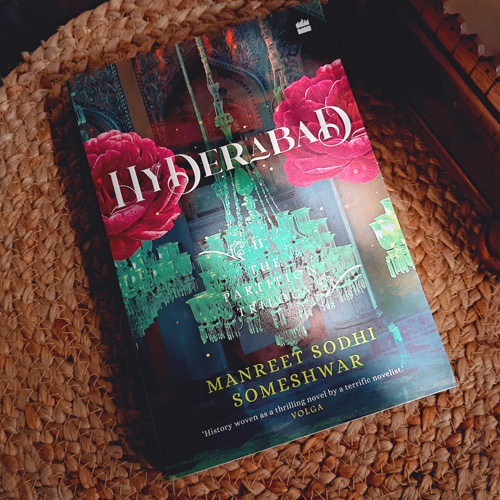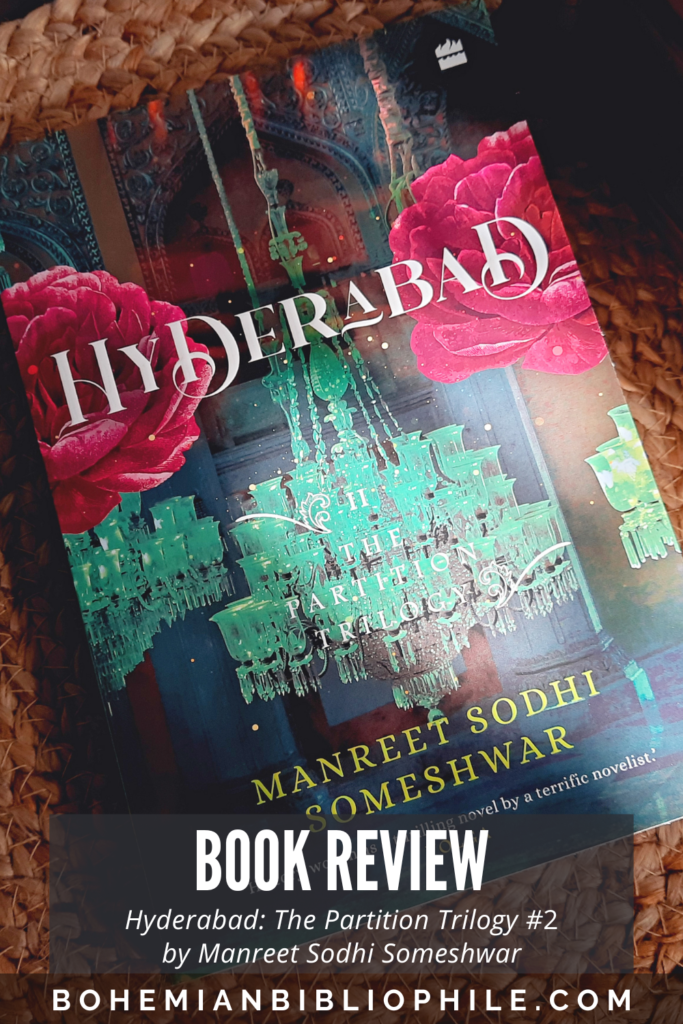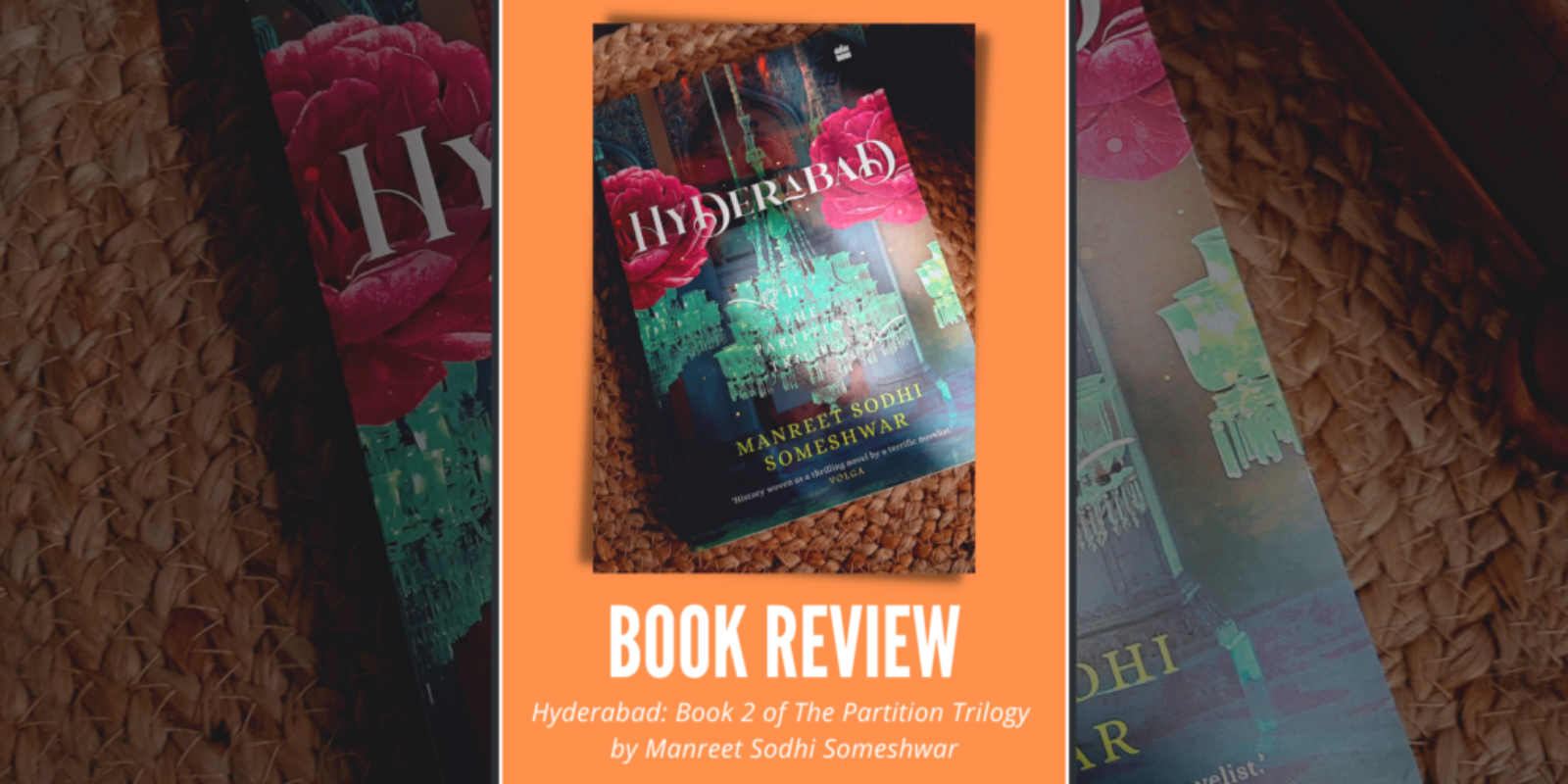
Genre: Historical Fiction
Publisher: HarperCollins India
Pages: 347
Published: September 2022
Rating: 5/5
Buy at: Buy on Amazon | Add to Goodreads
Review:
Lately, there have been numerous books on the partition. Most concentrate on the partition of Punjab and its effects on the common people. A few on the partition of Bengal. But we rarely get to read about how the princely states acceded to India and the politics involved. Primarily, the princely states of Hyderabad and Kashmir.
Set in the months right after the partition, Hyderabad is the second book in the Partition Trilogy by Manreet Sodhi Someshwar. It is a well-researched fictionalized account of historical events leading up to Operation Polo or the annexation of Hyderabad in 1948.
“From Aurangzeb to now, Asaf Jahs have ruled for three centuries. Hyderabad will remain FREE!”
While the first book, Lahore, delved more into the effect of partition on the common folk, Hyderabad is all about the newly independent India as it found its footing. And a ruler’s refusal to compromise on his state’s sovereignty. The Nizam of Hyderabad, Nawab Mir Osman Ali. Alongside, there are the wheeling dealings. The key players. The communists. The razakars. The Hindu mahasabhas. Facts we have rarely read about in history books.
Similar to the first book in the trilogy, there is an interesting mix between fiction and non-fiction. Vallabh Bhai Patel and Jawaharlal Nehru lock horns as they work together to fight external and internal enemies. Their consequent falling out. The assassination of Mahatma Gandhi and its aftermath.
Alongside, we have Nizam’s coterie, the communists, and the razakars. Walter Monckton, Nizam’s legal advisor, and his futile attempt to get the Nizam to see reason. Jaabili, a victim of the feudal system who finds a mission as a secret messenger. Uzma, another victim who finds safe haven with the Nizam’s daughter-in-law, Princess Niloufer. Daniyal Khan, a journalist whose mixed lineage is never really acceptable. Kasim Razvi, the founder of the Razakar militia that wreaks havoc. And Jinnah trying to bleed India with a thousand cuts.
“Forty years later, a deluge would arrive again, in September; it would shatter lives and change Hyderabad forever, once again.”
The author draws some interesting parallels with Mahabharat with a hint of magic realism. The Indus river undoing the bloodshed of the partition with a flood as it did with Hastinapur. Ghosts of women, the churails, who are the real victims of war.
I highly recommend the book. If you are a history buff or otherwise, it is an excellent read. Although I have lived at the foothills of Golconda Fort alongside the Musi river for almost four years, some of the events were new for me. True to say, one does not realize the history of a place and the bloodshed even when one grows up around it.
We are given a sneak peek into the going-on in Kashmir since it followed a similar timeline. But the author rightfully decided to devote the complete book to it. I am looking forward to the last and final book in the series – Kashmir.
Hyderabad: Book 2 of The Partition Trilogy by @manreetss #BookReview @HarperCollinsIN @blogchatter #BookChatter Share on X
About the author
Manreet Sodhi Someshwar is an award-winning and bestselling writer of seven books, including the Mehrunisa series and the critically-acclaimed The Long Walk Home and The Radiance of a Thousand Suns, and most recently, The Partition Trilogy. Hailed as ‘a star on the literary horizon’ by Khushwant Singh and garnering endorsements from Gulzar for two of her books, Manreet and her work have featured at literary festivals in Singapore, Shanghai, Hong Kong, India and NYC. Her articles have appeared in The New York Times, the South China Morning Post and several Indian publications. Manreet lives in New York, New York, with her husband, daughter and cat.
This review has been written as part of the Blogchatter Book Review Program. I was offered the book in exchange for an honest review. All opinions are my own.
This post may contain affiliate links. If you click on a link and make a purchase, I may receive a very small percentage of the sale at no cost to you.

